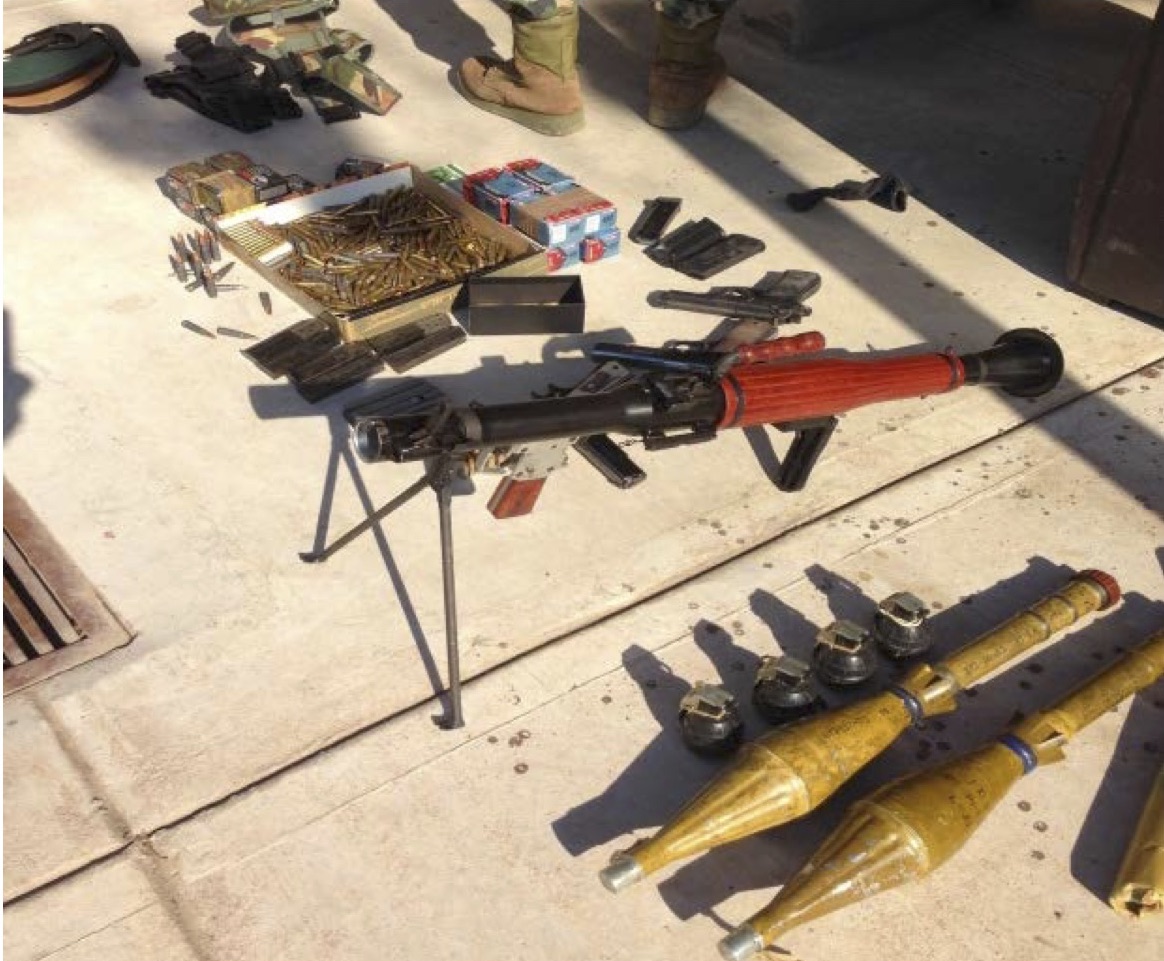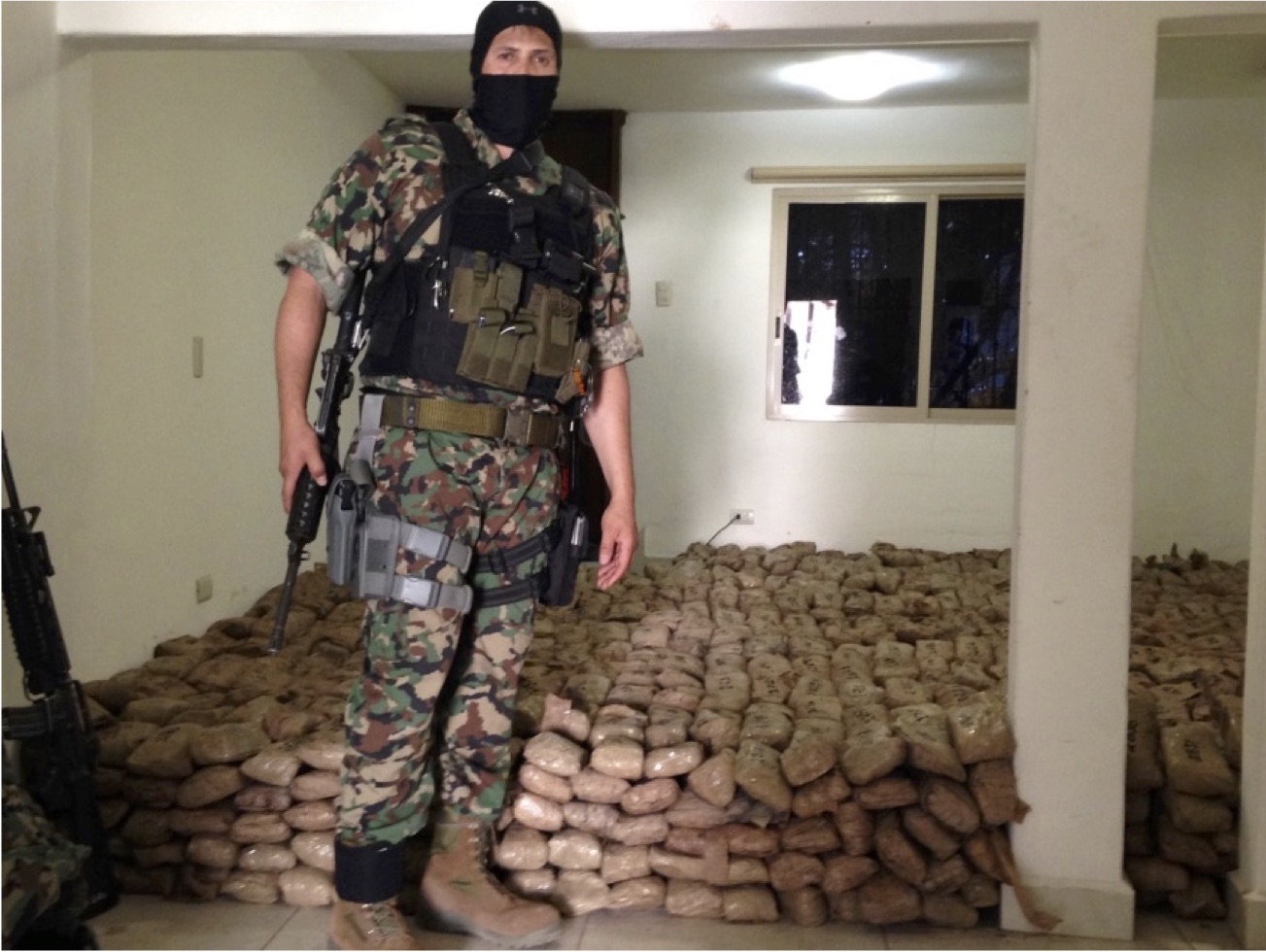It was around 4 in the morning on February 17, 2014, when Lucero Sanchez was jolted awake by shouting and a loud thumping noise. She had been sleeping next to her lover, Sinaloa cartel leader Joaquín “El Chapo” Guzmán Loera. A team of DEA agents and Mexican marines was hammering on the front door of their safe house with a battering ram.
Moments later, Sanchez heard Chapo’s personal secretary, a man she knew only by the name Condor, yell outside their bedroom: “ Tío, tío — open up! They’re on us!”
The next few minutes were frantic. Chapo was completely naked, but he didn’t have time to bother with clothes. As the marines struggled to break down the reinforced steel door, he and Condor ducked into the bathroom. “Love, love — come in here,” Chapo beckoned.
When she entered the bathroom, Sanchez could hardly believe her eyes. Hydraulic pistons had lifted up the bathtub, revealing the entrance to a hidden tunnel. The men hurried down a wooden ladder, and Chapo called for her to follow. She was terrified but did as he ordered.
“I heard him say to Condor, ‘Close up the tub,’ and he closed it and we were in complete darkness,” Sanchez recalled. “For me, it was horrible. I’d never been in a place like that. It was very humid and filled with mud.”
The bathtub tunnel connected to the sewer system in the city of Culiacán, Chapo’s stronghold in the Mexican state of Sinaloa. For the next hour, Chapo — still naked — led Sanchez, Condor, and a maid who was with them at the house on a mad dash through the filthy subterranean passageways. They emerged shaken but unscathed at a drainage canal, where one of Chapo’s men came to get them. They had escaped, at least for the time being.
Sanchez recounted her remarkable tale on Thursday, when she was called to testify against Chapo during his trial at the U.S. District Court in Brooklyn. Not only did her stunning testimony reveal new details about Chapo’s infamous escape through the bathtub tunnel, it likely shattered any remaining hope he had of winning an acquittal.

An escape tunnel beneath the bathtub in one of El Chapo's safe houses. Photo provided by the U.S. Attorney's Office.
Over the past nine weeks, the jury in Chapo’s case has heard from dozens of witnesses, including former high-ranking Sinaloa cartel members, ex-Colombian cocaine kingpins, and law enforcement officials from multiple nations. None of them were quite as compelling as Sanchez, a 29-year-old who briefly served as a local lawmaker in Sinaloa and was Chapo’s mistress from 2011 until his capture in 2014, a few days after the bathtub-escape incident.
With Chapo’s wife, Emma Coronel, watching impassively from the courtroom gallery, Sanchez portrayed the cartel boss she once loved as manipulative, overbearing, and ruthless. What began strictly as a romance when Sanchez was just 21 — more than 30 years younger than Chapo — morphed into something more sinister when he sent her on a mission to buy several tons of marijuana from farmers in the Golden Triangle, the drug-producing mountain region where both she and Chapo were born and raised.

Lucero Sanchez's mugshot. Photo provided by the U.S. Attorney's Office.
Sanchez testified that she knew little about the weed business, but she said Chapo gave her clear instructions on what type of product to purchase. He told her to remember “the three B’s for quality: buena, bonita, y barata — good, pretty, and cheap.”
It’s unclear exactly how Sanchez was introduced to Chapo, but he wooed her after sending one of his men to give her a cellphone. They began to communicate regularly, and before long she received a BlackBerry that was “fixed.” According to prior testimony in the case, such devices were bugged with spyware, which allowed Chapo to track her location, secretly monitor her calls and texts, and remotely turn on the phone’s microphone to eavesdrop on her conversations. Chapo did the same thing to his wife and at least one other mistress.
An informant gave the FBI access to Chapo’s spyware accounts, and prosecutors showed the jury text conversations between him and Sanchez. The messages (see PDF below) indicate Chapo was exploiting their relationship for his own gain, while Sanchez comes across as enamored and naive. In one exchange, she tells him about the brand she had stamped for him on 300 kilos of weed.
Sanchez: “The heart means that I love you, and the [number] four means that I bless the day that you came into this world. [kiss emoji] The day of your birthday [heart emoji].”
Chapo: “Oh, yes, that’s right. Buy 300 next week, and that way you can make another trip, love.”
Sanchez followed up by sending Chapo a picture of their baby son.
Chapo replied: “Hello, my king. I congratulate you because you’re a real man. Love, check how much there is [available] for you to buy it all, but you have to rip the bags and check properly, so you don’t buy any more with seeds.”
Sanchez testified that she felt sorry for the impoverished marijuana farmers and claimed that she was intentionally buying their low-quality product in hopes of provoking Chapo. “I was actually sending packages with seeds so he would get upset with me and ask me to come back,” she said.
Eventually, Sanchez said she was in near-constant contact with Chapo by phone. He would send her a new device every two weeks or so, and they would meet in person once or twice a month. At times she felt like a housewife, running errands for Chapo to buy him underwear and toiletries because he could not leave the house. But he still did not trust her completely. She said his workers would confiscate her phone before bringing her to Chapo, and they blindfolded her on the way to his safe houses.
“We spoke about our romantic relationship, things like that,” Sanchez said, recalling her conversations with Chapo. “He told me he wanted to have a more stable relationship.”
At the same time, Chapo was drawing Sanchez deeper into his drug empire. He used her to manage front companies, including a juice business based in Mexico City. He also tried to convince Sanchez to get her siblings involved in the drug trade, which she resisted. She testified that she and Chapo had grown apart by the end of 2012, but she felt trapped.
“The relationship ended but it seemed like it would never end,” she said.
Sanchez decided to switch careers and run for office, winning a local election in her hometown of Cosalá, Sinaloa, but said she was removed before the end of term “because of my relationship with Joaquín.”
Sanchez studiously avoided Chapo’s gaze on the witness stand and appeared to take no pleasure in testifying. She had a nervous tic that caused her to squint and blink her eyes. Following a break in the testimony and before the jury returned, she broke down in tears and had to be escorted out of the courtroom to regain her composure. She was wearing a lapel microphone and her sobs were still audible over the courtroom speakers while she was outside of the room, causing Chapo’s wife, Coronel, to smile and snicker.
The text messages between Chapo and Sanchez included several not-so-veiled threats about what would happen if she ever turned against him. “Look, the mafia kills people who don’t pay or people who snitch, but not if you’re serious, love,” he told her.
Sanchez testified that a short time before the bathtub escape in 2014, she was sharing a meal with Chapo at another safe house when Condor came to deliver some news. Chapo’s cousin, a man known as Juancho, was dead. Sanchez initially thought he had died of natural causes, but Chapo’s response suggested otherwise.
“At first, he did not react, then he looked at me seriously and then said some words I did not like,” Sanchez testfied. “What he said was from that point on, whoever betrayed him, they were going to die, whether they were family or women.”
Before Sanchez took the stand, the jury heard from Victor Vazquez, a DEA agent who led the effort to capture in 2014. He described what was happening while Sanchez and Chapo were asleep in bed at the safe house in Culiacán. The DEA, with help from Homeland Security Investigations, had cracked Chapo’s phone network and were monitoring his communications. First they arrested one of Chapo’s trusted underlings, who led them to the hideout. They caught Chapo by surprise, but it took nearly 10 minutes to break through his reinforced steel door, giving him enough time to open the bathtub and make his escape.
Later that day, Vazquez and the Mexican marines searched five of Chapo’s safe houses around Culiacán. All of them were connected by underground tunnels. Vazquez explained how plugging a piece of wire into an electrical outlet opened the bathtub in one of the houses. He could hear “a little crackling sound” as the sealant broke and the top of the tub popped open.
In one house, Vazquez and the marines found 2,800 packages of methamphetamine, hundreds of plastic bananas stuffed with cocaine, and a small arsenal of weapons, including a rocket-propelled grenade launcher. Personal items found at the house left no doubt about the owner. They found Chapo’s personal handgun — a .38 Super with his initials JGL on the diamond-encrusted grip — as well as photos of his family.

El Chapo's personal handgun. Photo provided by the U.S. Attorney's Office.
Vazquez said the DEA received intelligence that Chapo had fled to Mazatlán, a beach resort city 135 miles southwest of Culiacán. To avoid being spotted by cartel lookouts, the DEA agents and Mexican marines went to a local discount store to buy shorts, sandals, and beachwear. “We acted like we were going to the beach as tourists,” Vazquez said.
The DEA and Mexican marines arrived in Mazatlán on Feb. 22, 2014. Chapo was staying in Hotel Miramar, right on the beach. There were two local police cars stationed outside, which concerned Vazquez. He suspected they were on Chapo’s payroll, but the cops left when they were asked to. Vazquez testified that he remained in the hotel lobby while the marines searched the hotel, eventually surprising Chapo in a room on the fourth floor.
Chapo was alone with his wife and their infant twin daughters. He didn’t put up a fight. The marines also arrested Condor, who was armed, and a nanny who was caring for Chapo’s kids. Not a single shot was fired. Vazquez said the marines summoned him down to the parking garage underneath the hotel to confirm Chapo’s identity.

Weapons confiscated from the safe house. Photo provided by the U.S. Attorney's Office.
“At that moment, I even froze myself,” Vazquez said. “I said ‘Holy — it is him. I looked at him and I said, ‘Eres tu, It’s you.’”
On cross-examination, Chapo’s attorney Eduardo Balarezo showed Vazquez a photo taken shortly after the capture that showed bruises and marks on Chapo’s face and bare torso, suggesting he may have been beaten. He also questioned the DEA agent about carrying an assault rifle during the operation, since U.S. law agents are prohibited by Mexican law from carrying weapons in the country. But the evidence remained damning.
The DEA and marines took Chapo to a base north of Culiacán, then put him on a jet to Mexico City. He was behind bars for less than a year before he escaped again, this time through a mile-long tunnel that connected to the shower in his prison cell. He was finally recaptured in January 2016 and later extradited to New York to stand trial. A verdict in his case is now expected to come by early February.

Fake bananas filled with cocaine were found in one of Chapo's safe houses. Photo provided by the U.S. Attorney's Office.
Sanchez, meanwhile, was arrested in June 2016 while trying to cross the border from Tijuana to San Diego. Her lawyer said at the time that she was attempting to seek asylum for herself and her family. She eventually pleaded guilty last October to drug conspiracy charges and now faces 10 years to life in federal prison. She testified against Chapo in hopes of receiving a reduced sentence.
While her testimony will almost certainly help lead to a conviction of Chapo, it appeared at times that Sanchez was still under the spell of her former lover. Her description of their relationship destroyed the image of Chapo as the all-powerful drug lord, instead casting him as a petty villain in a telenovela. But she struggled to explain why she stuck with him for so long, even when he was wrecking her life.
“I was trying to keep him happy,” she said. “I was confused over my feelings for him. Sometimes I loved him and sometimes I didn’t.”

A DEA agent with bags of meth. Photo provided by the U.S. Attorney's Office.
Cover: A DEA agent in one of Chapo's escape tunnels.
